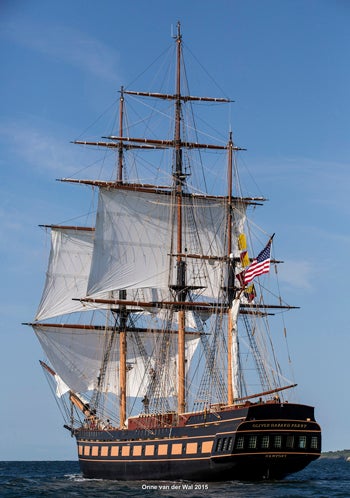The University of Rhode Island has received a $3 million grant from the National Science Foundation to conduct a ground-breaking research and education expedition into the Canadian Arctic’s Northwest Passage.
URI’s Graduate School of Oceanography’s Inner Space Center, an international facility that supports and conducts ocean science research expeditions, will lead the expedition, which will begin in August 2017.
The three-year Northwest Passage Project is a collaboration among GSO, the film company David Clark, Inc., and several other partners, including America’s newest tall ship, the SSV Oliver Hazard Perry, three science museums, PBS NewsHour Reporting Labs, and six Minority Serving Institutions: California State University Channel Islands; City College of New York; Florida International University; Texas State University; University of Illinois at Chicago; and Virginia Commonwealth University.
“This ground-breaking research and education project is a tremendous example of the innovative and forward thinking approach GSO investigators and its partners are applying to real world situations,” says Bruce Corliss, dean of GSO. “It also demonstrates the value of the partnerships and collaborations needed to broaden the impact of ocean science research in order to effectively expand the awareness of the environmental challenges that face the global community today.”
The consequences of climate warming are more pronounced and observable in the polar regions than any place else on Earth. The team will explore the changing Arctic through unprecedented educational and scientific endeavor, which centers around a five-week expedition on the SSV Oliver Hazard Perry, the first full-rigged sailing ship to enter the Northwest Passage in more than a century.
Two groups, each consisting of 18 students—six high school students, nine undergraduate students and three graduate students—will sail for 17-day legs of the expedition. The students will receive science instruction as the ship is underway, gain navigation and sailing skills and work alongside ocean scientists as they conduct Arctic research. The 18 undergraduate students will be from the Minority Serving Institutions. There will be a nationwide application process for high school and graduate students.
The students will also contribute to daily live broadcasts from the Arctic that will stream from the ship via satellite to the Inner Space Center, which will then send the live broadcasts to the Smithsonian Institution National Museum of Natural History, the Exploratorium in San Francisco and Alaska Sea Life Center in Seward, where audiences will be able to interact in real time with the scientists and students aboard the ship.
In addition to the live broadcasts from sea, the project will result in a two-hour, ultra high-definition documentary for television. The Minority Serving Institutions and the three science museums will host screenings of the film and events where the public can meet the expedition’s students and scientists.
Gail Scowcroft, associate director of the Inner Space Center and principal investigator and director of the project, says she is delighted to receive the grant.
“The rapidly changing Arctic environment is an issue of global importance,’’ Scowcroft says. “Broader impacts of Arctic research must include informing policy, educating the citizenry to make sound decisions, and inspiring students to become the next generation of scientists. Challenges to educating the public and communicating the realities and impacts of the changing Arctic must be overcome with credible, understandable science and proven methods of climate education. The project meets these challenges. We are extremely grateful to the National Science Foundation for giving us this opportunity, and we look forward to bringing high school, undergraduate and graduate students along on the expedition of a lifetime. We fully expect that the onboard team of filmmakers led by David Clark, an award-winning film producer and director, will capture the participants’ excitement so that the public can share in our journey.’’
“We are blessed with a top shelf team,’’ says Scowcroft. More than 25 ocean science researchers and educators from throughout the country will be involved. Brice Loose, a GSO scientist and co-principal investigator of the project, will be the chief scientist for the expedition and will lead the students in conducting cutting-edge research. Inner Space Center Director Dwight Coleman, an international leader in telepresence technology, will direct the shore-side operations of the expedition.
“It’s very exciting to partner with the Oliver Hazard Perry to bring this telepresence technology to a tall ship interested in scientific exploration and digital media in the modern age,’’ says Coleman. “This project will allow us to innovate and experiment with new technologies and methodologies that can lead to similar support for other ships to support their scientific, educational and outreach missions.’’
Loose says the team is grateful to the National Science Foundation for “recognizing the unique and innovative nature’’ of the project.
“This is a wonderful opportunity to sail the Northwest Passage in the tradition of the polar explorers, but with the capacities to carry out 21st century oceanography, including remotely operated vehicles, marine wildlife observations and greenhouse gas analyzers,’’ says Loose. “Gail Scowcroft and others deserve tremendous credit for putting together such an amazing program.’’
The scientists will depart from Newport in August 2017. The ship will sail to Pond Inlet in Nunavut, Canada, where the scientists and students will begin their research. The film crew will join the ship there. “Our Northwest Passage Project team will be part of history,’’ says Clark, “as we provide a visually stunning and historically poignant platform from which diverse audiences will experience a dramatically changing Arctic.”
For more information, visit www.Innerspacecenter.org or contact the Northwest Passage Project Coordinator Andrea Gingras at 401-874-6524.
Photo of SSV Oliver Hazard Perry by Onne van der Wal.
Media Contact: Elizabeth Rau 401-874-2116

